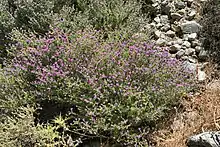Thymus capitatus
Thymus capitatus is a compact, woody perennial native to Mediterranean Europe and Turkey, more commonly known as conehead thyme, Persian-hyssop and Spanish oregano. It is also known under the name Thymbra capitata.
| Thymus capitatus | |
|---|---|
 | |
| Scientific classification | |
| Kingdom: | Plantae |
| Clade: | Tracheophytes |
| Clade: | Angiosperms |
| Clade: | Eudicots |
| Clade: | Asterids |
| Order: | Lamiales |
| Family: | Lamiaceae |
| Genus: | Thymus |
| Species: | T. capitatus |
| Binomial name | |
| Thymus capitatus (L.) Hoffmanns. & Link | |
| Synonyms | |
| |
Description
The plant has rising stems and narrow, fleshy, oil-gland-dotted green leaves that reach a length of 12 mm (0.47 in).
The pink, 10 mm (0.39 in)-long flowers are held in cone-shaped clusters at the ends of their stems in mid to late summer; they are protected by overlapping, 6 mm (0.24 in)-long, red-tinged bracts, edged in tiny hairs.
In Eurasia, a species of leafless parasitic dodder (Cuscuta epithymum) would often attach itself to the conehead thyme (Thymus capitatus), taking on the plant's pungency and from whence it also derived its host's Arabic name, al-ṣaʿitrah.[1]
Thymus capitatus is hardy from USDA Zones 7–10.[2] In Israel, the plant Thymus capitatus has protected status, making it a criminal offence to harvest it.[3]
See also
References
- Amar, Z.; Serri, Yaron (2004). The Land of Israel and Syria as Described by al-Tamimi – Jerusalem Physician of the 10th Century (in Hebrew). Ramat-Gan. pp. 70–72 (note 230). ISBN 965-226-252-8.
{{cite book}}: CS1 maint: location missing publisher (link) -- (OCLC 607157392) - Griffiths, Mark. Index of Garden Plants. (Portland: Timber Press, Inc., 1994; ISBN 0-88192-246-3.)
- Avi Shmida, MAPA's Dictionary of Plants and Flowers in Israel, Tel Aviv 2005, p. 355 (s.v. Coridothymus capitatus) (Hebrew) OCLC 716569354